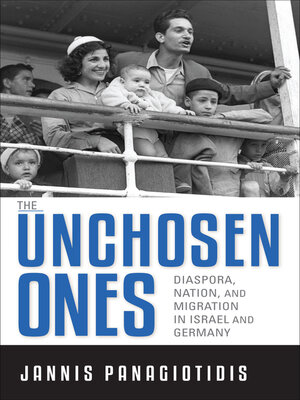The Unchosen Ones
ebook ∣ Diaspora, Nation, and Migration in Israel and Germany
By Jannis Panagiotidis

Sign up to save your library
With an OverDrive account, you can save your favorite libraries for at-a-glance information about availability. Find out more about OverDrive accounts.
Find this title in Libby, the library reading app by OverDrive.



Search for a digital library with this title
Title found at these libraries:
| Library Name | Distance |
|---|---|
| Loading... |
This “fascinating, original, well-researched, and persuasively argued work” examines the phenomenon of co-ethnic migration in Israel and Germany (Sebastian Conrad, author of What Is Global History?).
Co-ethnic migration happens when migrants seek admission to a country based on their purported ethnicity or nationality being the same as the country of destination. In The Unchosen Ones, social historian Jannis Panagiotidis looks at legislation and implementation regarding co-ethnic migration in Germany and Israel. This study focuses on individual cases ranging from after the Second World War to after the fall of the Berlin Wall where migrants were not allowed to enter the country they sought to make their home.
These rejections confound notions of an “open door” or a “return to the homeland” and present contrasting ideas of descent, culture, blood, and race. Questions of historical origins, immigrant selection and screening, and national belonging are deeply ambiguous, complicating migration even in nations that are purported to be ethnically homogenous. Through highly original and illuminating analysis, Panagiotidis shows that migration is never a simple matter of moving from place to place.
Co-ethnic migration happens when migrants seek admission to a country based on their purported ethnicity or nationality being the same as the country of destination. In The Unchosen Ones, social historian Jannis Panagiotidis looks at legislation and implementation regarding co-ethnic migration in Germany and Israel. This study focuses on individual cases ranging from after the Second World War to after the fall of the Berlin Wall where migrants were not allowed to enter the country they sought to make their home.
These rejections confound notions of an “open door” or a “return to the homeland” and present contrasting ideas of descent, culture, blood, and race. Questions of historical origins, immigrant selection and screening, and national belonging are deeply ambiguous, complicating migration even in nations that are purported to be ethnically homogenous. Through highly original and illuminating analysis, Panagiotidis shows that migration is never a simple matter of moving from place to place.







